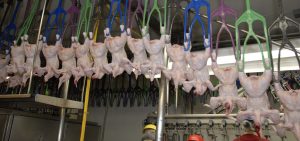News
Study Links Increased COVID-19 Transmission To Poultry Plants Allowed To Operate Faster
By: Liam Niemeyer | Ohio Valley ReSource
Posted on:
HENDERSON COUNTY, Ky. (OVR) — A study published Thursday in a prestigious scientific journal links significant increases in COVID-19 transmission rates to meatpacking plants, especially those facilities that the federal government has allowed to speed up processing lines.

The study, published in the Proceedings of the National Academy of Sciences of the United States of America, found that counties with poultry processing plants that received line speed waivers from the U.S. Department of Agriculture have double the rate of COVID-19 cases compared to counties with poultry plants that did not receive these waivers. Researchers found an even stronger connection with waivers given to processing plants this year.
“Of the 120 poultry plants in our sample, 48 plants currently have waivers, 16 of which were issued in 2020,” the study authors wrote. “Among plants issued a waiver in 2020, the relationship is even greater in magnitude. This finding suggests a potential pathway between a livestock plant’s operating procedures and COVID-19 transmission.”
Tyson Foods plants in Henderson County, Kentucky, and Corydon, Indiana, received waivers in April from the USDA Food Safety and Inspection Service to increase processing line speeds from 140 birds per minute up to 175 birds per minute. That decision came even as dozens of workers at the Henderson County plant were testing positive for COVID-19.
Adam Pulver is an attorney with the Public Citizen Litigation Group, a progressive advocacy organization representing unionized workers at those plants and others across the country in a lawsuit against the USDA. The suit alleges the USDA did not consider worker safety concerns when granting these waivers in a workplace that already sees high rates of workplace injury, and that the USDA did not allow for public comment on the waivers. Pulver said increased line speeds force workers closer together to move poultry through the processing line, reducing social distancing between workers.
“Adopting these increased line speeds shows complete disregard for worker safety, even before COVID,” Pulver said. “Now, it’s just maniacal, completely disregarding the fact that putting workers closer together and increasing the pace puts them basically at risk of death and also bringing back COVID to the communities that surround them, which this study particularly focused on.”
Researchers found evidence these plants were drivers of COVID-19 cases in the communities they were located in, with increased coronavirus case rates up to 90 miles away from a plant. The study estimates between 236,000 and 310,000 COVID-19 cases, and between 4,300 to 5,200 deaths are linked to meatpacking plants as of July 21.
“In other words, for every worker infected at a livestock plant, between seven and eight local nonworkers were ultimately infected by the end of the sample period, underscoring the high potential for community spread,” the study states.
Researchers also found that following within a week of a plant closure to halt the spread of COVID-19, growth rates of COVID-19 spread significantly decreased. Counties that had plant shutdowns had higher overall COVID-19 caseloads, which researchers said was likely “because closures occurred too late to suppress community spread outside of these plants.”
A spokesperson for Tyson Foods did not respond to questions about the study, or if processing line speeds increased following the granted waivers at plants in Henderson County, Kentucky, and Corydon, Indiana. The industry group National Chicken Council is not involved with the lawsuit against the USDA regarding processing line speed waivers, but the group previously put forth a similar waiver request to remove the speed limit on the evisceration line at plants. That idea was ultimately rejected by the USDA.
NCC Spokesperson Tom Super previously told the Ohio Valley ReSource in August there was no evidence that increased line speeds in evisceration lines are more susceptible to COVID-19 transmission. In a statement on Thursday Super said his group is reviewing the study, but is confident there is still no link between COVID-19 transmission and line speed waivers because evisceration lines are automated.
Pulver, the attorney representing meatpacking workers, said there’s “nothing new” about the way plants are operating now compared to the past decade.
“The industry could have played a huge role in reducing the spread of the pandemic and they made the choice not to do so. They put a lot of pressure on federal and state government officials to keep them from doing things that would have actually saved hundreds and thousands of people from contracting COVID,” he said.
A report from ProPublica earlier this year revealed through emails how meatpacking companies fought with local health agencies over measures to reduce COVID-19 spread, including a health department leader in western Kentucky worrying about reports of plant management forcing symptomatic employees to continue working.

